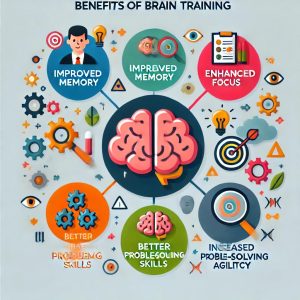By: Dr. Michael Turner, Neuropsychologist and sexual health expert
Contents
- 0.1 Introduction
- 0.2 Benefits of Brain Training
- 0.3 Long-Term Effects of Brain Training
- 0.4 Brain Training Simplicity
- 0.5 Balancing Brain Hemispheres
- 0.6 Components of Brain Training
- 0.7 Choosing a Brain Training Program
- 0.8 Brain Training for Children
- 0.9 Brain Training Games
- 0.10 Brain Training for Learning-Disabled Adults
- 0.11 Brain Training vs. Depression and Anxiety
- 0.12 Battle Against Alzheimer’s Disease and Dementia
- 1 Conclusion
Introduction
Brain training, also known as cognitive training, involves exercises designed to improve various brain functions, including listening, reading, writing, and visual and auditory skills. Beyond improving cognitive abilities, brain training is increasingly recognized by healthcare professionals as an effective form of cognitive therapy.
Benefits of Brain Training

Brain training offers numerous benefits across different age groups and conditions:
For the Elderly
Studies indicate that brain training can delay the onset of dementia and Alzheimer’s disease, which are major causes of cognitive decline in the elderly. Health experts recommend engaging in brain training activities daily after the age of 60 to prevent memory loss.
Brain Gymnasiums
There are “brain gymnasiums” specifically designed to help baby boomers and the elderly train their brains. These gymnasiums feature brain games that enhance flexibility, memory, spatial recall, and problem-solving skills.
For Children with ADHD
Cognitive brain training can also benefit children diagnosed with Attention-Deficit/Hyperactivity Disorder (ADHD). Research by Rosemary Tannock of the University of Toronto and Susan Gathercole from the University of Durham in England shows that cognitive brain training can improve focus and short-term memory in children with ADHD.
Computer Software and Applications
Using computer software for brain training is cost-effective and efficient for one-on-one instruction. These programs provide immediate positive reinforcement through rewards and praises, boosting confidence and self-esteem.
For Stroke and Brain-Related Diseases
Brain training is also beneficial for individuals coping with stroke and brain-related diseases. Research from the University of Queensland’s Queensland Brain Institute (QBI) indicates that brain cells can wither and die without electrical and chemical stimulation. Thus, brain training helps keep neurons active and functioning.
Long-Term Effects of Brain Training

The advantages of brain training extend beyond short-term memory improvement. Research by Elizabeth A.L. Stine-Morrow from the Beckman Institute at the University of Illinois demonstrated that cognitive skills acquired through brain training can have long-lasting effects, significantly impacting mental health over the years.
Brain Training Simplicity
Every day brings changes in the brain’s functioning level. Engaging in training exercises, no matter how simple or complex, ensures continued mental fitness.
Daily Challenges
Begin with simple challenges to preheat your mind. For example, switch to using your non-dominant hand for daily routines like brushing your teeth or handling the mouse. These activities help strengthen neural connections by exposing the brain to new skills.
Children’s Play
For children, play is an essential tool for enhancing hand-brain coordination and developing fresh neural connections. Simple activities like manipulating clay dough can significantly impact their cognitive development.
Physical Activity and Exploration
Physical activities and exploration, similar to the nomadic nature of early human civilizations, contribute to brain health. Constant movement and a diverse diet support brain nourishment and cognitive function.
Early Brain Stimulation
Medical professionals recommend stimulating the brain from a young age to store cognitive reserves that fend off brain-damaging disorders. Reading regularly is one effective method of keeping the brain active and healthy.
Games and Coordination
Board games like crosswords and scrabble efficiently stimulate the brain. In England, studies showed that elders who play Bingo have improved hand-eye coordination and reduced forgetfulness.
Visualization and Muscle Strength
A study at the Cleveland Clinic Foundation found that mental exercises could enhance muscle strength. Participants who imagined themselves using specific muscles showed significant strength increases, highlighting the brain’s role in physical health.
Age and Brain Training
Age should not be a barrier to brain training. In fact, older brains have a greater capacity for enrichment. Thus, continuous mental exercise is crucial for maintaining cognitive health.
Balancing Brain Hemispheres
The brain is divided into two hemispheres, each responsible for different functions. Training activities that balance these hemispheres are essential for optimal brain function.
Left Hemisphere
The left hemisphere processes information systematically and logically. Activities like puzzles and crosswords can enhance problem-solving abilities and logical reasoning.
Right Hemisphere
The right hemisphere is associated with creativity and intuition. Engaging in games that challenge the mind to think outside the box can enhance creativity, memory, and concentration.
Components of Brain Training
Brain training involves more than just mental exercises. A comprehensive approach includes physical training, emotional balance, mental workouts, proper nutrition, and a healthy lifestyle.
Physical Training
Physical exercise is crucial for brain health, providing the necessary oxygen and nutrients for neurons. It also enhances cognitive functions, learning, and memory.
Nutrition and Diets
A restricted-calorie diet can increase the life expectancy of neurons. The Mediterranean diet, rich in fruits, vegetables, and healthy fats, is particularly beneficial for brain health.
Emotional Balance and Healthy Lifestyle
Maintaining emotional balance and a healthy lifestyle is essential for brain health. A positive outlook, curiosity, and moderation in all things contribute to cognitive well-being.
Super Fuels
Certain substances like caffeine can boost brain functions such as vigilance and memory. Consumed in moderation, these substances can have positive long-term effects.
Choosing a Brain Training Program
The market for brain training products is growing, catering to different age groups and needs. Here are some tips for choosing the right program:
- One-on-One Attention: Choose a program that offers personalized attention and immediate feedback.
- Focus on Weaknesses: Select a program that targets cognitive skills you need to improve.
- Enjoyable Training: Ensure the program is enjoyable and engaging.
- Comprehensive Training: Opt for programs that include a variety of exercises and practical applications.
Brain Training for Children
Brain training significantly benefits children, improving their cognitive abilities, focus, and memory retention. Understanding the stages of cognitive development helps in introducing appropriate exercises.
Brain Training Games
Brain training games have been scientifically proven to improve various cognitive abilities. These games enhance memory, problem-solving skills, and reaction speeds, among other mental functions.
Brain Training for Learning-Disabled Adults
Brain training can also benefit learning-disabled adults, improving their memory and cognitive functions. Consistent brain training activities can lead to significant improvements in daily tasks and overall mental health.
Brain Training vs. Depression and Anxiety
Emotional brain training can help reduce stress and anxiety, promoting a sense of calm and relaxation. Techniques like neurofeedback train the brain to respond positively to stimuli, helping manage anxiety and depression.
Battle Against Alzheimer’s Disease and Dementia
Brain training exercises can delay the onset of dementia and Alzheimer’s disease. Engaging in cognitive activities helps maintain cognitive functions and slow down disease progression.
Conclusion
Brain training offers numerous benefits, from improving cognitive functions to enhancing emotional well-being. Engaging in a comprehensive brain training program that includes mental exercises, physical activity, and a healthy lifestyle can significantly impact your mental health and cognitive abilities.
Dr. Michael Turner is a renowned neuropsychologist and sexual health expert with a Ph.D. in Neuroscience. He specializes in studying the effects of neuroplasticity on sexual health and intimacy. Dr. Turner conducts research and workshops that focus on how individuals can rewire their brains to improve sexual function and enhance intimate relationships. His approach combines cutting-edge neuroscience with practical strategies for sexual wellness.


